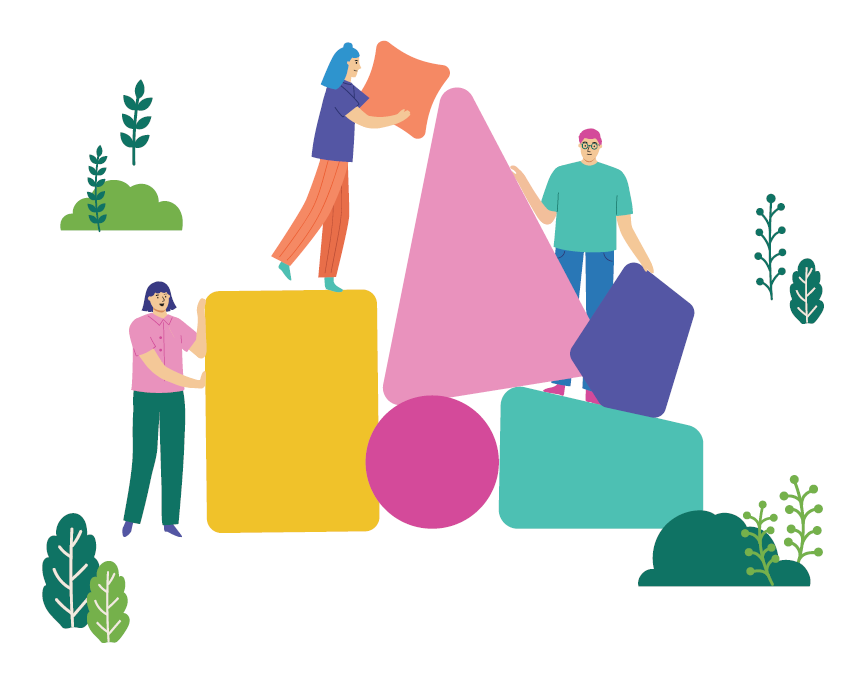FORUM THEATRE - Action for positive social change
Session 1 - Introduction
Welcome to this training!
If you have come to this page it is probably because you want change!

Through following this course you can learn the skills to effect change in communities, to avoid major social problems by imagining and rehearsing alternatives.
We are addressing the dreadful results of humans being trafficked and enslaved. People are treated like goods and are abused, damaged physically and mentally and many die as a result.
The change we want to see is that people are not abused or damaged and that they do not die. By learning and sharing this course you can save lives!
Before you start, please take a moment to pause and reflect on the change you want to see. Think of the issues and think of a world where those issues do not exist. It is that vision of change which will drive us to make good Forum Theatre and help our communities.
Although we focus here on human trafficking and modern slavery Forum Theatre can be used to tackle many other social issues. Across the world it is used to think of alternatives in matters of: Child abuse, climate change, suicides, gang violence, prejudice, HIV/AIDS awareness, gender issues, drug addiction, abuse in the workplace, corruption and much more.
Child abuse, climate change, suicides, gang violence, prejudice, HIV/AIDS awareness, gender issues, drug addiction, abuse in the workplace, corruption and much more.
You are now joining thousands of others worldwide who use theatre to make the world a fairer place
Let’s start with the word “play” – it is going to be very important: Our morning preparation every day will include games and exercises to warm up your bodies and voices, to stimulate your imaginations and to exercise your spontaneity... A lot of your learning will be through play - so enjoy it!
- Names and Movement
- The group stand in a circle.
- To learn everyone in the group’s name, the first person says his/her name and at the same time makes a body movement, the rest of the group repeat it (say the name and do the movement together)
- The second person says his/her name and at the same time makes a body movement, the rest of the class repeat it (say the name and do the movement together)
- And so on…
- Making a group agreement
The group is invited to sit in a circle and creates a mutual agreement about how they are going to work together, especially letting each individual feel they are ready to try new things and dare to do new things. This may be a list of rules or requests. They may also want to include how they will respond if someone breaks a rule or does not observe a request.
Some suggestions
- Listen to each other attentively
- Support each other without aggression
- No competition with others– only try to be better than yourself
- No violence and no pain
- Punctuality
- No use of mobile phones - turn them off!
- No smoking and alcoholic drinks during working time
- Group responsibility - each actor should be able to perform each character in all the plays so that, in case one person is not there, another person can perform the role.
- A leader has to be transparent, democratic and non- judgmental.
- Voice exercises
i) Chewing gum to warm up the face, mouth, lips, tongue
All participants imagine they have a very big, tough, chewing gum and have to chew it with as large a movement of the mouth as possible. Use all the muscles you can.
ii) Breathing
Establish strong abdominal breathing, because the breath is the base for the voice and movement. Hold your hand over your belly (just below the navel) and imagine breathing into that area so that it swells. On the out breath it will push into the body. You can develop it by practising a quite fast in-breath and a slow controlled out-breath. If you breathe in and then count with a soft voice as you breathe out you are helping your control. Start with counting to five on the out-breath, then ten, then 15, then 20. Can you go further? Don’t strain anything, and check that you are not moving the shoulders – it should all be powered from the abdomen.
iii) Finding the sounds
- With the abdominal breathing and an open throat you can now engage the breath with the vocal chords or vocal folds. This creates the sound. We want to avoid tension in the voice. If you feel tension, yawn and stretch. This opens the back of the throat in an almost uncontrollable way.
- Stand in an easy position with the feet slightly apart. Take a deep breath in and breathe out without making a sound. Do this several times.
- Repeat this but make a very breathy 'Haa' sound as you breathe out. Do this several times.
- Again take a deep breath in. As you breathe out let the air gently touch the vocal chords to make a very soft, breathy 'aaaah' sound. Feel as if the air is caressing the vocal chords, not attacking them.
- Repeat that, but each time try to let a little more air through the vocal chords to vibrate them and make sound. You should concentrate on feeling the mechanism of the voice – breath – air – vocal chords – sound.
- This voice will be relaxed and quite a low tone because it is so relaxed.
- Produce that same tone but jump gently while making the sound. The movement of the body will push air up through the throat and open it. As you land you will hear a slight volume increase in the voice. Keep the mouth open and you will feel the effects of the jumping better.
- Other ways of increasing the volume on that basic tone are to raise and drop the shoulders as you produce the tone, or to gently beat your fists on your chest, lower ribs and abdomen to 'massage' the voice out of you. You can also do this to a partner. Watch that your partner keeps the mouth open and the shoulders relaxed as they produce the sound.
What is theatre?

Ask the whole group to sit down in a circle and discuss the following two questions:
- What does ‘theatre’ mean to you?
- What are the tools for actors on the stage, except props?
Encourage everyone to speak and when the group’s ideas have been expressed we can make some....
suggestions for a definition:
Theatre takes place where live performers (actors) creatively use dramatic means to communicate an idea to an audience. Theatre is an ancient art which has taken many different forms all over the world. It can include storytelling, music, dance and puppetry. It can be used to communicate a story, a play, a myth, a message. It can take place in any environment where people are able to watch and hear it – whether it be a theatre building, a street, a temple, a marketplace or under a tree.
No matter where, why and how it is presented, the single most important element of theatre is human interaction. Without human beings present, both performing and watching, theatre cannot take place. It is this human quality which gives theatre its power. Theatre is a very immediate way to explore human experience, to understand life’s problems, to dialogue and to find meaning. Not least, theatre can give people enormous pleasure.
Theatre also has a huge potential to engage people, because like life, it has many dimensions. Theatre can have an effect on every human sense, it can be physical, emotional and spiritual, it can be an intensely personal experience, yet have enormous social impact.
Crucially theatre is the only art which can include many other creative forms from music to movement, painting to poetry, fireworks to film, dance to drama.
Theatre is a diverse language with a wide vocabulary. Through the rich language of theatre human beings can ‘speak’ about issues relevant to their lives. For all of these reasons, and more, theatre can be positive and powerful in any society. This is why we chose theatre.
There are very powerful tools for actors on the stage, except props, they are body, voice and the strong connection between individuals which will be developed effectively through many games and activities in the following training days.
Take some questions from the group. Make sure that they all understand the scope and flexibility of theatre. Ask them to imagine different places where they might make theatre.